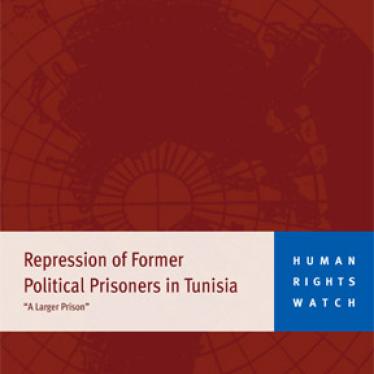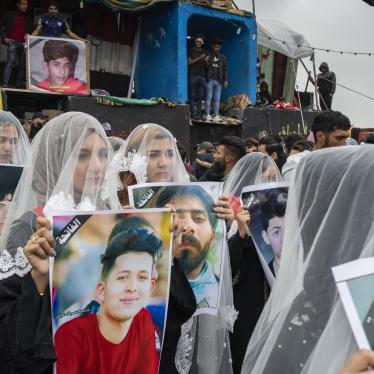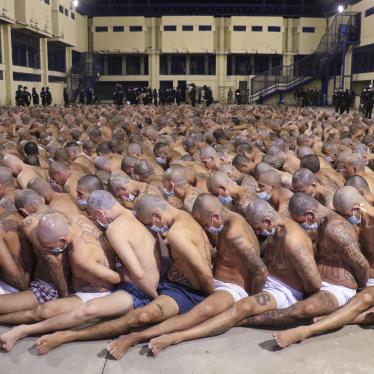(Tunis) - The Tunisian authorities blocked journalists from attending a Human Rights Watch briefing to release a report critical of the government, Human Rights Watch said today. On March 22 and 23, 2010, officials said they would not allow Human Rights Watch to hold the event but did not present any legal basis for the decision.
Human Rights Watch went ahead with a public release of "A Larger Prison: Repression of Former Political Prisoners in Tunisia," but plainclothes police physically prevented journalists and human rights activist lawyers from reaching the venue. Only one diplomat and three human rights activists were able to reach the event, which was also a teleconference, to present Human Rights Watch's findings that Tunisia's measures against former political prisoners seem aimed at ensuring that dissidents are unable to resume normal lives upon release.
"The Tunisian government's attempt to ban Human Rights Watch from holding a news conference shows a disturbing lack of respect for free speech," said Sarah Leah Whitson, Middle East and North Africa director at Human Rights Watch. "Who is free to speak in Tunisia when the government tries to silence an international human rights organization?"
On March 22, the Minister for Communications, Oussama Romdhani, told Human Rights Watch that the government did not want the news conference to proceed. Officials from the ministries of Interior and Justice said that they would not allow it to proceed because it "tarnishes the image of Tunisia and is one-sided and biased." Some journalists received phone calls from the authorities that the Human Rights Watch event was forbidden.
Several hotels in Tunis that had previously offered Human Rights Watch rates for a room for the briefing withdrew those offers. A hotel suite booked by Human Rights Watch on March 23 was flooded three hours after the Human Rights Watch staff checked in and then left for dinner; and the hotel was unable to offer Human Rights Watch another room. As a result, the event was moved to the offices of a Tunis law firm.
Plainclothes police officers on foot, on motorcycles, and in cars have openly and regularly followed Human Rights Watch staff as they moved about Tunis. At least six plainclothes security agents patrolled the street outside the downtown law office and recorded the license plate numbers of cars parked nearby.
The 42-page report documents the range of repressive measures, many of them arbitrary, that Tunisian authorities impose on former prisoners. These include close monitoring and surveillance, denial of passports, threats to re-arrest some who speak out on human rights or politics, and restrictions on movement. In July 2009, Human Rights Watch wrote to the ministers of Interior and Justice presenting a detailed summary of the findings and asked for comments or corrections, but received no response. The government now complains its views are not reflected in the report.
Human Rights Watch previously held news conferences in Tunis in 2004 and 2005, without incident. In the past year, Human Rights Watch has held numerous news conferences in the region, including in Bahrain, Egypt, Israel, Iraq, Jordan, Kuwait, Lebanon, Libya, Morocco, the United Arab Emirates, and Yemen.
"It's disappointing that the space for freedom of expression is so visibly shrinking in Tunisia," said Whitson. "The government didn't even try to hide its heavy-handed interference in our event, a disturbing signal of just how bold Tunisia feels in silencing anyone and everyone who dares to criticize its record."
Journalists who said the police prevented them from reaching the event include Rachid Khechana and Mohamed Hamrouni of al-Mawqif, an opposition weekly, Lotfi Hidouri of al-Quds press, and Slim Boukhdir of the Egyptian daily al-Masriyoun.








